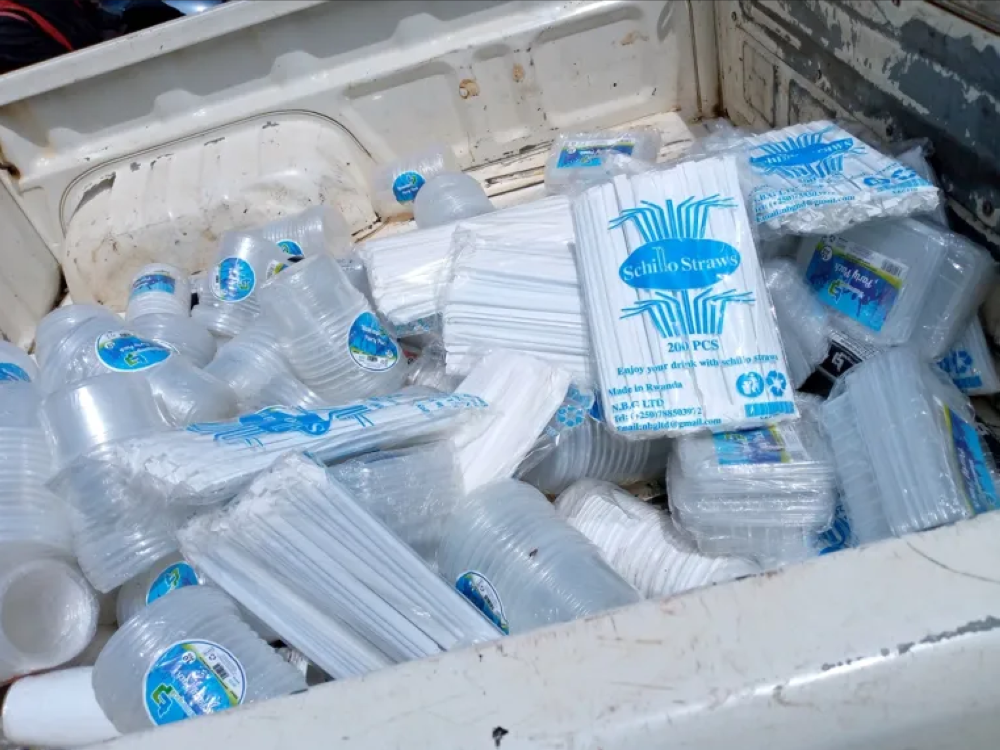

An initiative of Rwanda Environment Management Authority (REMA) and Private Sector Federation (PSF) has helped collect 2,280 tonnes of single use plastics for recycling over the past two years, The New Times has learnt.
The move is part of implementing a law prohibiting the manufacturing, importation, use and sale of single-use plastic items passed in Rwanda in 2019.
ALSO READ: How new reverse vending machines will boost recycling in Kigali
The collection of plastic waste under the REMA-PSF partnership started in May, 2022, implemented by two companies, Enviroserve Rwanda Green Park and We Can Recycle.
We Can Recycle took over the collection of single use plastics after the contract of Enviroserve, which had collected more than 930 tonnes, expired in September 2023.
As of August 8, We Can Recycle had collected 1,350 tonnes of single use plastics, according to Philbert Nkurunziza, Ecosystem Recovery and Pollution Management Program Manager in Single Project Implementation Unit (SPIU), at REMA.
Thus, the total quantity of single use plastics collected from May 2022 up to August 2024 is 2,280 tonnes,” he explained.
Recycling companies say that Rwanda needs the capacity to collect more than 6,000 tonnes of single-use plastic waste every year.
Collected single-use plastic waste is crushed to produce pellets which are raw material to produce other products, such as dustbins, jerricans, and packaging materials, among others.
In addition to environmental conservation, recycling also creates jobs.
The project implemented by We Can Recycle created 350 green jobs from plastic waste collection and 700 plastic waste collectors received training on plastic waste management, Nkurunziza said.
ALSO READ: Rwanda’s journey towards promoting circular economy
Challenges in rural areas
In rural areas, biodegradable waste is often managed effectively by turning it into fertilizers. However, plastic waste remains a significant challenge due to the lack of proper collection and disposal methods.
Residents in rural areas resort to burning plastic waste when their storage is full, which in turn contributes to air pollution.
"We really don&039;t have many options when it comes to dealing with plastics,” said John Habimana, a resident of Gakenke District.
"We keep them for as long as we can, but once our storage is full, we resort to burning them. We know it’s harmful, but we no other options,” he said.
Marie-Claire Umuhoza, who lives in Rulindo District, echoed the same sentiment, noting that while biodegradable waste is useful as fertilizer, plastic waste is more difficult to manage.
"If there were systems in place, like dedicated trucks for plastic waste collection, it would make a big difference," she said.
ALSO READ: Govt calls on legal experts to support global treaties on plastic waste
To address the concern, REMA has recommended that local authorities consider establishing a sustainable solution for solid waste, including designating standard landfills.
"The dumpsites assessed did not meet the standards and the districts were recommended to embark on the 4R (Reduce, Reuse, Recycle and Recovery) approach,” REMA’s Nkurunziza noted.
He added that districts have been recommended to work with waste collecting companies to collect the garbage from the community to the centralized dumpsites and to provide the required minimum measures to protect the environment as they are looking for sustainable solutions.
Olivier Mbera, Enviroserve Rwanda Country Manager, said that they are planning to expand their project countrywide to collect waste amid shortage of landfills.
"We currently have more than 14 collection points in Rwanda and we are having 30 by the end of this year. Enviroserve is building more collection points in rural areas in south and eastern regions to increase the collection of single used plastics,” he said.


